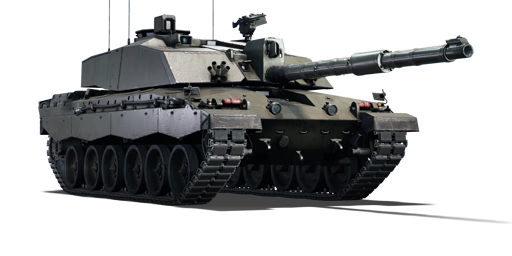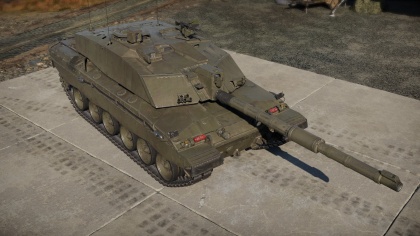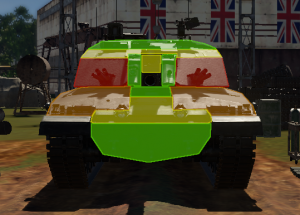Challenger 2
Contents
| This page is about the British medium tank Challenger 2. For other uses, see Challenger (Disambiguation). |
Description
The Tank, Combat, 120-mm Gun, Challenger 2 is a rank British medium tank
with a battle rating of (AB), (RB), and (SB). This tank was introduced in Update 1.87 "Locked On".
General info
Survivability and armour
The Challenger 2 reinforces the strengths of the Challenger 1 Mk.2/Mk.3, with extremely well protected turret cheeks and better UFP protection, while suffering from similar weaknesses - a particularly weak lower front plate and negligible side protection. However, unlike the Challenger 1, the Challenger 2 possesses a much larger weak spot on the inner cheeks; rounds that hit the small cheek sections directly adjacent to the gun will often penetrate, in many cases damaging turret components and crew members. Additionally, the taller turret design exposes a weak frontal roof slope - while this is a somewhat small vulnerability, penetration may result in the gunner or commander's incapacitation. As such, the Challenger 2 thrives in hull-down positions where minimal vulnerabilities are exposed and it can retreat into further cover if one of the few weak spots are penetrated. In situations where protective positioning is not an option, the Challenger 2 should be used conservatively and carefully, avoiding direct confrontation wherever possible.
Mobility
The Challenger 2 is fitted with a similar twin turbo V12 diesel engine to the Challenger 1, producing a maximum of 1,200 horsepower. The CR2 can reach a maximum forward speed of 66 km/h (41 mph) in AB and 59 km/h (37 mph) in RB. The vehicle's stock performance is lacklustre, with acceleration and manoeuvrability suffering due to the CR2's 62.5 tonne total weight. However, once all upgrades are researched, the Challenger 2 performs acceptably, despite being generally out-classed by competitor vehicles like the M1A1 and T-80U. The CR2 also utilises a fully functional neutral steering system, and even when stock the vehicle's neutral steering ability is admirable - easiest used with manual gear selection to avoid shifting during traverse. Notably, the CR2's reverse speed is quite comfortable, with the vehicle capable of up to 36 km/h (RB/SB) backwards thanks to the two reverse gears.
| Weight (tons) | Add-on Armour
weight (tons) |
Max speed (km/h) |
|---|---|---|
| 62.5 | N/A | 66 (AB) |
| 59 (RB/SB) | ||
| Engine power (horsepower) | ||
| Mode | Stock | Upgraded |
| Arcade | 1,886 | 2,290 |
| Realistic/Simulator | 1,076 | 1,200 |
| Power-to-weight ratio (hp/ton) | ||
| Mode | Stock | Upgraded |
| Arcade | 30.18 | 36.64 |
| Realistic/Simulator | 17.22 | 19.20 |
Armaments
Main armament
The Challenger 2's primary armament is the 120mm L30A1 cannon. Unlike most modern MBT cannons, the L30A1 is rifled as opposed to smoothbore. This is primarily due to the British preference for HESH (High Explosive Squash Head) ammunition availability, the design of which requires a rifled cannon for accurate fire. The rifled design has some positive attributes: it's extremely accurate with both HESH and APFSDS rounds, including at long range; however the downside is a limited selection of ammunition: the CR2 only has the L23A1 and L26 APFSDS rounds, the L31A7 HESH round and the L34 Smoke round available to it.
The L30A1 has a base reload time of 6.5 seconds, improving to around 5 seconds with an aced crew. As a result, the Challenger 2 sports the fastest reloading 120mm cannon in-game (as of the time of writing). In addition, the Challenger 2 allows the L30A1 a comfortable 10° of gun depression and a reasonable turret traverse speed.
The characteristics of the CR2 in combination with the L30A1 weight the vehicle towards a long-range sniping playstyle, something the vehicle generally feels very comfortable doing.
| 120 mm L30A1 | |||||
|---|---|---|---|---|---|
| Capacity | Vertical guidance |
Horizontal guidance |
Stabilizer | ||
| 50 | -10°/+20° | ±180° | Two-plane | ||
| Turret rotation speed (°/s) | |||||
| Mode | Stock | Upgraded | Prior + Full crew | Prior + Expert qualif. | Prior + Ace qualif. |
| Arcade | 29.50 | _.__ | _.__ | _.__ | _.__ |
| Realistic | 18.40 | _.__ | _.__ | _.__ | _.__ |
| Reloading rate (seconds) | |||||
| Stock | Prior + Full crew | Prior + Expert qualif. | Prior + Ace qualif. | ||
| 6.50 | _.__ | _.__ | _.__ | ||
Ammunition
| Penetration statistics | |||||||
|---|---|---|---|---|---|---|---|
| Ammunition | Type of warhead |
Penetration in mm @ 0° Angle of Attack | |||||
| 10m | 100m | 500m | 1000m | 1500m | 2000m | ||
| Shot L23A1 | APFSDS | 396 | 394 | 387 | 376 | 367 | 357 |
| Shell L31A7 | HESH | 152 | 152 | 152 | 152 | 152 | 152 |
| Shot L26 | APFSDS | 471 | 469 | 464 | 457 | 450 | 443 |
| Shell details | ||||||||||
|---|---|---|---|---|---|---|---|---|---|---|
| Ammunition | Type of warhead |
Velocity in m/s |
Projectile Mass in kg |
Fuse delay
in m: |
Fuse sensitivity
in mm: |
Explosive Mass in g (TNT equivalent): |
Normalization At 30° from horizontal: |
Ricochet: | ||
| 0% | 50% | 100% | ||||||||
| Shot L23A1 | APFSDS | 1,535 | 3.89 | N/A | N/A | N/A | +1.5° | 75° | 78° | 80° |
| Shell L31A7 | HESH | 670 | 17.10 | 0.4 | 0.1 | 4,100 | +0° | 73° | 77° | 80° |
| Shot L26 | APFSDS | 1,550 | 4.10 | N/A | N/A | N/A | +1.5° | 78° | 80° | 81° |
| Smoke characteristic | ||||||
|---|---|---|---|---|---|---|
| Ammunition | Velocity in m/s |
Projectile Mass in kg |
Screen radius in m |
Screen time in s |
Screen hold time in s: |
Explosive Mass in g (TNT equivalent): |
| L34 | 670 | 17.1 | 20 | 5 | 25 | 50 |
Machine guns
The Challenger 2 possesses one pintle-mounted 7.62 machine gun and one coaxial 7.62 machine gun. While these aren't particularly effective against aircraft, they can be used as a deterrent, and lucky shots may result in critical damage or pilot snipes. Besides anti-aircraft fire, they're useful for clearing light obstacles and the crew of open-top vehicles.
Usage in battles
The Challenger 2 should be played as a support tank. Try not to rush to capture points without knowing where the enemy is. The Challenger 2 really is not a street fighter or a rusher, the tank is designed for defensive game play so it should be played defensively.
When playing in city maps, try to find a spot where you can aim at enemies but that they can't get behind you very easily. Taking an enemy to the front is the best chance you got in a knife fight. Some enemies may forget that the Challenger 2 has a weak LFP and often try to take out your gun and gun breech, but since it's a knife fight, enemies will screw up their shots so you may have a chance winning. Taking a shot on the side is never a good option.
Try following the American or Russian tanks and give them support since the Challenger 2 won't be able to do a lot on its own. Take good care of the mini-map and try to predict where the enemy will go or come from. If you see a lot of team members being destroyed, take note since there is a big chance that a Leopard 2 may come from that direction. This precaution must be considered due to the Challenger 2s lack of mobility. The Challenger 2 is not slow, it's just not the fastest tank. The German and Russian tanks will get to the capture point much faster than any Challenger 2. Play with this thought in mind and if you need to go for a cap, try to scan the area really well before going in.
In open maps, try to find a good hull-down position. Don't give the enemy a chance firing at your weak spots. You don't want to play a fair fight, this is not a tank which can win a game on its own. It can do a lot more than the previous Challenger 1, but it's not able to carry games. The best usage in battles is to find the best spots and find your own way. But every way will be the same: defensive.
Pros and cons
Pros:
- Very accurate gun with good optics
- Good gun depression
- Fast reload rate
- Strong turret cheeks and hull's upper frontal armour
- More powerful engine than Challenger 1
- Good reverse speed
- Has ESS, smoke shells and smoke grenades
Cons:
- Ammo storage can be hit very easily, like in previous Challenger 1
- Weak frontal lower glacis
- Big weak spot near the gun breach
- The upper part of the turret is vulnerable to HEAT shots
- No reactive armour
- Poor manoeuvrability compared to other main battle tanks of the rank
History
Work on developing a successor to the Challenger 1 began only a short time after the vehicle entered service with the British armed forces. Already by the mid-1980s, the Vickers company had developed a new MBT as part of a private venture. After requirements for a next-generation MBT have been issued, Vickers immediately submitted their design on the new Challenger 2 to the Ministry of Defence. Having briefly considered the adoption of the M1 Abrams, the Ministry decided to proceed with the Vickers design by ordering the construction of a prototype Challenger 2 for testing and evaluation. The Challenger 2 passed the evaluation and met expectations even when put through comparative testing against contemporary MBTs of other nations, such as the American M1 Abrams and German Leopard 2. Satisfied with the test results, the Ministry of Defence adopted the Challenger 2 and placed the first production order in 1993, with the initial batch consisting of 127 tanks in addition to 13 trainer vehicles. The first Challenger 2 tanks were delivered to the tank regiments by 1994. The Challenger 2 participated in several operations during the ‘90s and into the 2000s, ranging from peacekeeping missions on the Balkans to military interventions in Iraq. A number of Challenger 2 MBTs have also been exported to Oman, with this nation being the only operator of the Challenger 2, besides the UK. Production of Challenger 2 tanks seized in 2002 after all pending production orders were fulfilled, with close to 440 vehicles being produced. Since 2008, Challenger 2 tanks have constantly been undergoing modernization work, with a number of upgrade packages being developed. Thanks to these upgrades, the Challenger 2 MBT is expected to serve with the British Army well into the future.
- From Devblog
Media
Excellent additions to the article would be video guides, screenshots from the game, and photos.
See also
Links to the articles on the War Thunder Wiki that you think will be useful for the reader, for example:
- reference to the series of the vehicles;
- links to approximate analogues of other nations and research trees.
External links
| Britain medium tanks | |
|---|---|
| Valentine | Valentine I · Valentine IX · Valentine XI |
| Cromwell | Cromwell I · Cromwell V · Cromwell V (RP-3) |
| Cromwell derivatives | Challenger · Avenger · Comet I · Comet I "Iron Duke IV" · Charioteer Mk VII |
| Centurion | Centurion Mk 1 · Centurion Mk.2 · Centurion Mk 3 · Centurion Mk.5 AVRE · Centurion Mk 10 · Centurion Action X · FV4202 |
| Vickers MBT | Vickers Mk.1 · Vickers Mk.3 · Vickers Mk.7 |
| Chieftain | Chieftain Mk 3 · Chieftain Mk 5 · Chieftain Mk 10 |
| Challenger 1 | Challenger Mk.2 · Challenger Mk.3 · Challenger DS |
| Challenger 2 | Challenger 2 · Challenger 2 (2F) · Challenger 2 TES · Challenger 2 OES · Challenger 2E · Challenger 2 Black Night |
| Challenger 3 | Challenger 3 TD |
| Australia | A.C.I · A.C.IV · Centurion Mk.5/1 |
| South Africa | Olifant Mk.1A · Olifant Mk.2 · TTD |
| India | Vijayanta · Bhishma TWMP |
| Israel | ▄Sho't Kal Dalet |
| Jordan | Khalid |
| Sweden | ▄Strv 81 (RB 52) |
| USA | Grant I · Sherman II · Sherman Firefly · Sherman IC "Trzyniec" |






